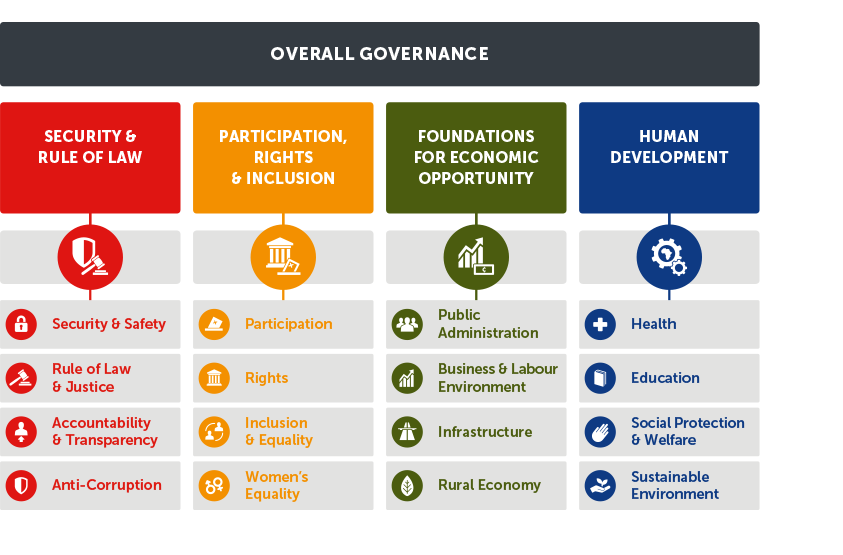Webinar recap: Governance in Focus - Regional Integration & the AfCFTA
17 April, 2023
On 6 April, Ben Chandler, Senior Researcher in MIF's research team, presented the economic findings from the 2022 Ibrahim Index of African Governance with a focus on what this means for trade and the success of the African Continental Free Trade Area. He was joined by, Ma Soukha Ba, a member of MIF's Now Generation Network (NGN) and a senior private sector development specialist.
The session began with Ben explaining the key focus of the Ibrahim Index of African Governance (IIAG). The IIAG is a framework for citizens, governments, institutions, academics, and businesses to assess the delivery of public goods, services, and policy outcomes across the continent. The 2022 IIAG has 81 indicators with 223,020 data points for 54 countries and 265 variables from 47 different sources across a 10-year period. The Index is a powerful tool because it allows users, such as policymakers or stakeholders to compare the improvement or stagnation of countries under four categories that form the Overall Governance score:
- Security & Rule of Law (SRL)
- Participation, Rights & Inclusion (PRI)
- Foundations for Economic Opportunity (FEO)
- Human Development (HD)
These four categories are then divided into 16 sub-categories.
The speakers outlined that there has been steady progress in the Foundation for Economic Opportunity (FEO) category, which has caused optimism, unlike other categories such as Participation, Rights & Inclusion or Security & Rule of Law that have not performed as well. FEO has followed a positive trajectory over the decade, improving by 3 points since 2012.
During the session, Ben also highlighted that Infrastructure is the only sub-category for which all 54 countries have improved since 2012. This is largely due to progress in digital infrastructure. Despite being the IIAG's most improved sub-category since 2012 (+8.1), Infrastructure remains the lowest scoring in 2021 (37.5).
RECs: Regional Integration indicator scores (2021)
What does the 2022 IIAG tell us about regional integration and the AfCFTA?
The 2022 IIAG provides valuable insights into regional integration and the progress of the African Continental Free Trade Area (AfCFTA). The IIAG assesses several indicators that can inform us about the success of the AfCFTA and whether necessary groundwork has been laid for it to thrive.
According to the IIAG, the Economic Community of West African States (ECOWAS) is leading the way in regional integration, scoring 49.7 out of 100.0, thanks in part to its open visa regimes. However, the share of intra-African trade in the Southern African Development Community (SADC) is actually twice as high as in ECOWAS.
The Regional Integration indicator, with a score of 39.5 out of 100.0 in 2021, remains among the bottom quarter of IIAG indicators, despite showing improvement over the last decade (+1.8). Government efforts to promote regional integration and relaxed visa regulations have driven this progress. Nevertheless, intra-regional trade has declined as a share of the total since 2012, with intra-continental trade accounting for less than 13% of Africa's total trade, compared to over 60% in Europe and Asia & Oceania, and over 40% in the Americas.
Only five African countries (Botswana, Lesotho, Mali, Namibia, and Zimbabwe) conduct most of their trade with other African countries.
Inadequate transport infrastructure has long been a significant challenge for Africa, making intra-regional trade expensive and inaccessible, irrespective of tariff reductions. A successful AfCFTA requires better transport networks, but the IIAG shows little progress in this area, which is a cause for concern.
Access to digital platforms is also crucial for the AfCFTA's success. The IIAG indicates that digital access has improved, but there is still a long way to go. Since 2012, every country in Africa has had greater access to the Internet and computers, with all African countries but Sudan having experienced an increase in mobile connectivity and communication. However, nearly 600 million Africans still lack access to electricity, which is a prerequisite for digital access.
World countries: Access to electricity
Of the 81 indicators in the IIAG, Mobile Communications (+21.8) and Internet & Computers (+16.9) have shown the most improvement over the decade.
Ma Soukha Ba pressed the need for African countries to prioritise better infrastructure development, as highlighted by the African Union's master plan to develop connectivity corridors for intra-African trade. Private sector participation in financing this infrastructure, including through public-private partnerships (PPPs), is necessary to achieve this goal. Developing industrial clusters and special economic zones, whether national or cross-border, is also crucial for boosting Africa's domestic private sector. However, there is currently no way of measuring or capturing the state of development for these clusters and economic zones in the IIAG.
In conclusion, the 2022 IIAG provides valuable insights into regional integration and the progress of the AfCFTA. Despite some progress in areas such as digital infrastructure and regional integration, there is still much work to be done in developing better transport networks and ensuring access to electricity to fully realise the potential of the AfCFTA. Private sector participation and investment in infrastructure development are key to achieving this goal.
To watch this session, including the engaging Q&A with the audience, please visit MIF.live.



